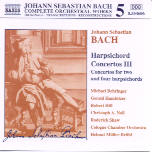Bach’s concertos for multiple harpsichords and orchestra are beloved by some and drive others crazy. Perhaps no other music so graphically illustrates Beecham’s famous description of the sound of the solo instrument as “two skeletons copulating on a tin roof.” The performers must exercise great care in selecting instruments that are not too “clangy” sounding, and the recording has to balance a need for warmth and roundness of tone with contrapuntal clarity. In fact, most of this music was originally composed for melody instruments (violin and oboe, principally), and Naxos has obligingly reconstructed the original versions on another disc in this excellent series. One of the nicest things about this particular disc is the presence of the original version (by Vivaldi) of the Concerto for Four Harpsichords, an impossible work that is performed here about as well as it ever has been. In fact, all of these performances are uniformly propulsive, tasteful, and above all genuinely comfortable to listen to. A good listen, then, but best enjoyed one work at a time.
































